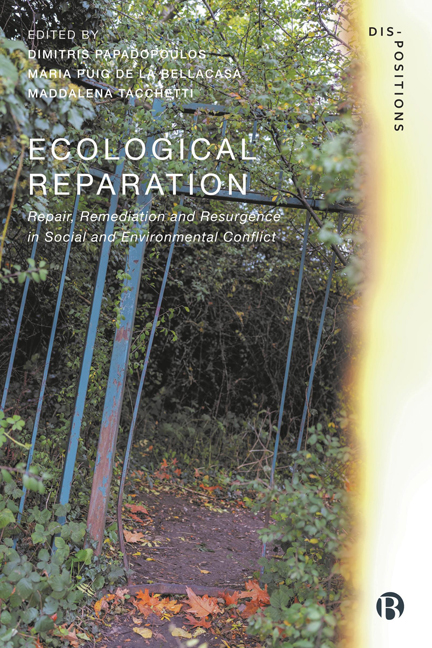Book contents
- Frontmatter
- Contents
- List of Figures
- Notes on Contributors
- Acknowledgements
- Note on the Figures
- Dis-Positions Series Preface
- Introduction: No Justice, No Ecological Peace: The Groundings of Ecological Reparation
- PART I Depletion<>Resurgence
- PART II Deskilling<>Experimenting
- PART III Contaminating<>Cohabiting
- PART IV Enclosing<>Reclaiming Land
- PART V Loss<>Recollecting
- PART VI Representing<>Self-governing
- PART VII Isolating<>Embodying
- PART VIII Growth<>Flourishing
- Index
20 - Chilean Streets: An Archive against the Grain of History
Published online by Cambridge University Press: 28 March 2024
- Frontmatter
- Contents
- List of Figures
- Notes on Contributors
- Acknowledgements
- Note on the Figures
- Dis-Positions Series Preface
- Introduction: No Justice, No Ecological Peace: The Groundings of Ecological Reparation
- PART I Depletion<>Resurgence
- PART II Deskilling<>Experimenting
- PART III Contaminating<>Cohabiting
- PART IV Enclosing<>Reclaiming Land
- PART V Loss<>Recollecting
- PART VI Representing<>Self-governing
- PART VII Isolating<>Embodying
- PART VIII Growth<>Flourishing
- Index
Summary
Chilean streets, October 2019
Estallido social: these are the Spanish words that people use to refer to what in this article we call ‘Chilean streets’. Estallido social, a social outburst: on 18 October 2019 crowds of protesters took to the streets in the defence of life and against everyday abuse and death in Chile. They wrecked sites that they considered denied their lives and also transformed street walls with words, images and art that proposed hope for a different life. They expressed what we think of as ‘historical wounds’ that the state – colonial and modern – inflicted on the Chilean territorial body as it made a nation on it. In response, the government declared both a ‘state of emergency’ and ‘a war’, bringing the military onto the streets for the first time since the Chilean military dictatorship ended in 1990.
We translate ‘estallido social’ as ‘outburst’: people loosely organized burst out, away from a suffocating grip. In Chile heterogeneous desires and frustrations ‘outbursted’ away from a recent history of neoliberal suffocation; against it ‘the streets’ propelled a demand to rewrite the neo-liberal constitution and obliged the government to accept the project. But ‘the outburst’ also expressed wounds grounded in history, current and past; it emerged against the official historical oblivion of those wounds. As event, the outburst expressed the long durée that birthed it and actively cracked the dam that contained it. In so doing, the outburst may be an event beyond, and perhaps because of, its ephemerality. This eventfulness may also have an oxymoronic and bold future long durée that asserts a possible that while still unknown, may now pulsate as imaginable and against the history that in suffocating them, also allowed their becoming. ‘Chilean streets’ may project a proposal away from the grip of neoliberal politics and the long History that made it. Surpassing the limit that denied them (Guha, 2003), ‘the streets’ became an avalanche. Thus, we propose Chilean streets – and perhaps streets in other parts of Latin America – become in an outside in which they ferment and self-transform in constant and irreducible excess to politics as usual. The streets may be subject to brutal state repression and/or conversely their demands may be accomplished by the government or its opposition, and their force placated.
- Type
- Chapter
- Information
- Ecological ReparationRepair, Remediation and Resurgence in Social and Environmental Conflict, pp. 301 - 326Publisher: Bristol University PressPrint publication year: 2023

